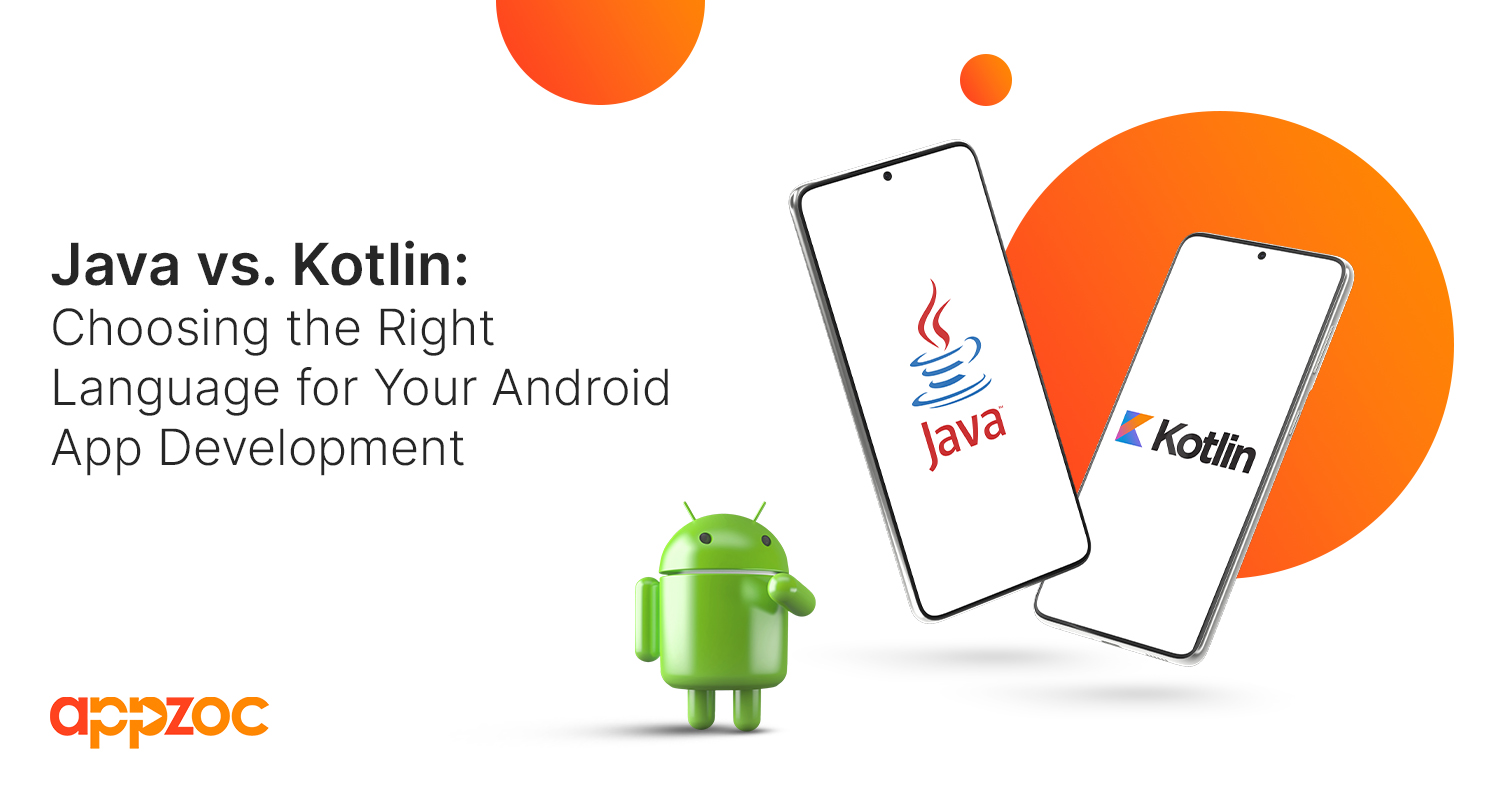
Flutter
Make the most of this cutting-edge technology by developing apps quickly! Our Flutter solutions have amazing features that can be used to create sleek, high-performance apps that can scale seamlessly across platforms.

With over 2.5 billion active Android devices worldwide, Android app development continues to offer huge potential. But with new languages emerging, deciding whether to use tried-and-tested Java or modern Kotlin can be difficult.
In this guide, we’ll compare Java and Kotlin for building Android apps so you can determine the right language for your project and development team. Whether partnering with an android app development company in Bangalore or looking for android app developers in Kerala, understand the key differences between these languages.
Java has been the official language for Android since inception.This battle-tested language is object-oriented, simplified from C++, and integrates seamlessly with Android SDKs. It enjoys strong community support and a vast talent pool of Java developers worldwide.
Kotlin is a newer open-source language, first announced for Android in 2017. Designed by JetBrains as an enhancement over Java, Kotlin became an officially supported Android language in 2019. It builds upon Java’s strengths while addressing common complaints like verbosity and unclear null pointer errors.
Now that both languages are supported and stable options moving forward, analyzing their technical differences helps determine suitability.
Java utilizes a C-like syntax with braces {} required to denote blocks of code. Its rigid, verbose style enables robust functionality but is less human-readable.
Kotlin employs a more flexible syntax using a mix of short declarations and nested blocks for improved readability. Less code is required to achieve equivalent functionality.
A Kotlin application can leverage any Java framework or library seamlessly, granting flexibility. Kotlin’s interchangeable nature makes adopting Kotlin easy even for existing Java code bases. Conversion plugins allow automatically translating Java code into Kotlin as the first step.
Kotlin is also now fully supported across all modern Android OS releases and integrated with official IDEs like Android Studio. Either language will integrate smoothly into the development environment.
A billion dollar mistake within programming has been allowing variables to hold “null” or absent values. In Java, this has resulted in countless runtime errors and complicated code to address null checking.
Kotlin’s null safety builds in protections against null related errors. The compiler disallows assigning null values unless specifically declared as “nullable”. This simplifies coding significantly by handling null checking at compile time rather than causing app crashes.
Managing concurrency in Android for complex operations like asynchronous requests or parallel processing has often required error-prone techniques in Java like wait()/notify().
Kotlin’s higher-level concurrency utilities known as coroutines provide an easier abstraction over threads. Coroutines simplify coding complex concurrent flows by avoiding deep call stacks and callback hell.
Kotlin requires much less actual code to execute equivalent application functionality as Java. Without the verbosity and nesting, developers write nearly 40% less code. This enables faster development while improving maintainability long-term.
For example, defining a basic class with a member function in Java may take 5+ lines. The same class in Kotlin is often just a single line thanks to its simplified object-oriented syntax.
A Kotlin file can call Java code whenever beneficial, while Java can also access Kotlin methods and properties seamlessly at runtime. This flexibility enables mixing languages within a codebase to maximize strengths. Gradual adoption of Kotlin can benefit legacy projects via interoperability.
Java enjoys strong community support as one of the most commonly used languages globally in enterprise development. An abundance of tools, tutorials, Q&A sites, and Java developers makes ramp up easy.
Kotlin has seen massive growth recently but still lacks the maturity and depth of resources for Java education. However, Kotlin’s similarities to Java along with its expressiveness and compact syntax facilitates picking up the language quickly, especially for experienced Java programmers.
In terms of hireability, Java remains massively in demand worldwide. But Kotlin skills are becoming increasingly sought after by tech companies and startups focused on modern development practices.
Kotlin lands among the fastest growing and highest paid programming skills year over year. Its adoption continues rising across organizations.
When it comes to runtime performance, Kotlin generates nearly equivalent bytecode to Java. Thus, speed and efficiency are quite comparable between the two languages in practice.
Certain edge cases around things like nested lambdas may run slower in Kotlin during the initial run. But just-in-time compilation addresses these variances quickly for subsequent executions.
Analyzing all factors from technical merits to business considerations allows determining an optimal option personalized for your app project and internal development processes.
Also Read:How to Optimize App Development for Maximum ROI
Kotlin rectifies several longstanding Java issues while bringing improved syntax, safety and concurrency management to Android app development. But Java retains upside through vast community support and developer familiarity.
Determining the ideal language comes down to internal development dynamics – team skills, existing code, timelines and technical priorities. Kotlin adoption continues accelerating across organizations. But Java remains the reliable, gold-standard option that cannot be discounted.
By weighing all considerations covered here, you can determine the most appropriate primary language for launching quality Android mobile apps. Leverage external specialists that offer expertise in both languages to keep options flexible.